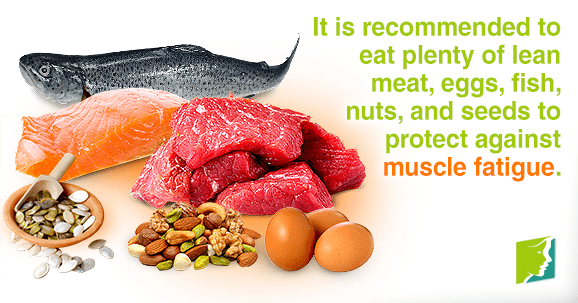Muscle fatigue means the muscles are unable to generate much force, so trying to carry out the most basic of physical tasks, such as picking something up, can be very difficult. Muscle fatigue can have a severe effect on home and work life, especially if you are required to carry out strenuous physical activity. Read on to find out important things to know about muscle fatigue.
Estrogen Fluctuations Are a Cause
This is a primary reason for the condition, as the female sex hormones play a chief role in determining and maintaining muscle mass. For this reason, many women can fall victim to muscle fatigue during their period or as they go through menopause. Menopausal fatigue is common and women especially feel the effects because the estrogen production does not replenish; there is a natural decline until it reaches a very low level. This is confirmed by the fact that after menopause, there is an average decrease in muscle mass of 0.6% per year.
Stress Is a May Contribute
Free radicals are molecules that can cause damage to cells; in fact, they are thought to be the main cause of aging. Youth and a diet high in antioxidants like vitamin C mean the body is able to repair this damage more efficiently. If the body is exposed to too much pollution - such as airborne pollutants or unhealthy habits like smoking - then the amount of free radicals in the body is increased. Oxidative stress on the muscles will reduce muscle mass and mean the muscles cannot work at optimum efficiency, leading to muscle fatigue.
Protein Can Protect Against It
Proteins are a main substance in muscle and must be regularly replaced through diet. If a diet is low in protein, then the amino acids that protein is made of are not being replenished. When muscle needs to be repaired from wear and tear, muscle mass naturally declines. It is recommended to eat plenty of lean meat, eggs, fish, nuts, and seeds to protect against muscle fatigue.
Exercise Increases Muscle Strength
If muscles are not used, then they decrease in size and strength, meaning the body has to exert more energy to produce enough force for the little things. Therefore, it is important to have a regular exercise regime to build power and reduce muscle fatigue. It will be impossible to launch into exercise in the periods you are feeling exhausted through muscle exertion, so make the most of the periods that you are feeling more energetic. However, build up exercise gradually and listen to your body's own rhythms.
Muscle fatigue can be caused by uncontrollable factors as well as lifestyle habits, but the treatments are fortunately very much controllable. There is no quick fix, but with a bit of motivation, effort, and patience, muscle fatigue can be eliminated, or at least greatly reduced. Read on about remedies for muscle fatigue.
Sources
- Betteridge, D.J. (2000). What is oxidative stress? Metabolism, 49(2 Suppl 1), 3-8. Retrieved from http://www.ncbi.nlm.nih.gov/pubmed/10693912
- Judelson, D.A. et al. (2007). Hydration and muscular performance: does fluid balance affect strength, power and high-intensity endurance? Sports medicine, 37(10), 907-921. Retrieved from http://www.ncbi.nlm.nih.gov/pubmed/17887814
- Maltais, M.L. et al.(2009). Changes in muscle mass and strength after menopause. Journal of the International Society of Musculoskeletal and Neuronal Interactions, 9(4), 186-197. Retrieved from http://www.ismni.org/jmni/pdf/38/02MALTAIS.pdf
- National Institutes of Health. (2008). Making and Maintaining Muscle: How Much Protein Do You Need? Retrieved September 30, 2014, from http://newsinhealth.nih.gov/2008/March/docs/01features_01.htm




